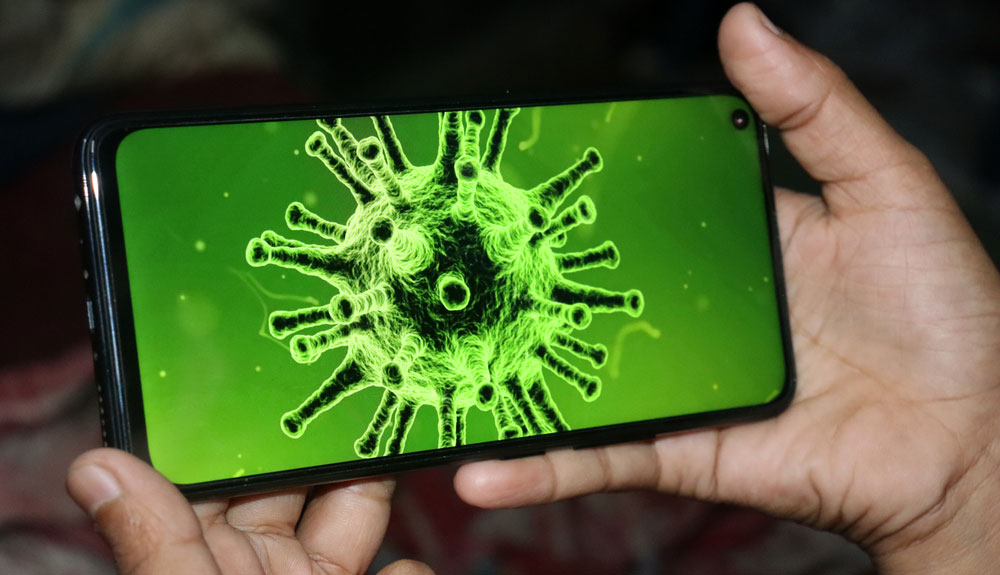Ransomware spoofs COVID-19 contact-tracing app: What to do
Malware mimics official Canadian contact-tracing app before it's even available

Here at Tom’s Guide our expert editors are committed to bringing you the best news, reviews and guides to help you stay informed and ahead of the curve!
You are now subscribed
Your newsletter sign-up was successful
Want to add more newsletters?

Daily (Mon-Sun)
Tom's Guide Daily
Sign up to get the latest updates on all of your favorite content! From cutting-edge tech news and the hottest streaming buzz to unbeatable deals on the best products and in-depth reviews, we’ve got you covered.

Weekly on Thursday
Tom's AI Guide
Be AI savvy with your weekly newsletter summing up all the biggest AI news you need to know. Plus, analysis from our AI editor and tips on how to use the latest AI tools!

Weekly on Friday
Tom's iGuide
Unlock the vast world of Apple news straight to your inbox. With coverage on everything from exciting product launches to essential software updates, this is your go-to source for the latest updates on all the best Apple content.

Weekly on Monday
Tom's Streaming Guide
Our weekly newsletter is expertly crafted to immerse you in the world of streaming. Stay updated on the latest releases and our top recommendations across your favorite streaming platforms.
Join the club
Get full access to premium articles, exclusive features and a growing list of member rewards.
Canadians are being targeted by a new ransomware campaign that pretends to be an official coronavirus contact-tracing app.
The ransomware, called CryCryptor and discovered by researchers at cybersecurity firm ESET, infects Android devices and encrypts the files of unsuspecting victims.
- The best Android antivirus apps to keep your mobile devices safe
- VPN: add an extra layer of security with a virtual private network
- Latest: All the new iOS privacy features, including what it stole from Android
Online crooks are circulating the ransomware via two websites that claim to offer official contact-tracing services from Health Canada. Created in early June, the ransomware uses source code from programming repository Github.
"CryCryptor surfaced just a few days after the Canadian government officially announced its intention to back the development of a nation-wide, voluntary tracing app called COVID Alert," explained ESET's Lukas Stefanko in a blog post. "The official app is due to be rolled out for testing in the province of Ontario as soon as next month."
After conducting a detailed analysis of the ransomware, ESET researchers posted a decryption app on Github that allows users to decrypt files breached by CryCryptor.
Encrypting all files
Stefanko said the ransomware encrypts "all the most common types of files", while a "readme" file containing the crook's email address appears in "every directory with encrypted files".
ESET researchers came across the ransomware on Twitter, and after analysing it, they went on to discover a flaw that allows crooks to "launch any exported service provided by the ransomware".
Get instant access to breaking news, the hottest reviews, great deals and helpful tips.
Once launched, the ransomware gains necessary permissions to enter files and subsequently encrypts them. However, the phone's screen will not be locked and the device will still be usable.
"Selected files are encrypted using AES with a randomly generated 16-character key. After CryCryptor encrypts a file, three new files are created, and the original file is removed," said Stefanko.
"The encrypted file has the file extension '.enc' appended, and the algorithm generates a salt unique for every encrypted file, stored with the extension '.enc.salt'; and an initialization vector, '.enc.iv'."
When all files have been encrypted, users then see a notification that says "Personal files encrypted, see readme_now.txt". This appears in every compromised file.
How to avoid this Android ransomware
To avoid falling victim to this ransomware, ESET recommends: "On top of using a quality mobile security solution, we advise Android users to install apps only from reputable sources such as the Google Play store."
To use ESET's own decryption tool, browse to https://github.com/eset/cry-decryptor/releases and download the file named "CryDecryptor.apk" to your Android phone or to a Mac or a PC.
If you downloaded the file straight to an Android device, locate the Downloads folder in a file manager, find the downloaded CryDecryptor.apk and double-click it.
Your phone should alert you that this is a suspicious file (that's normal) and will prompt you to change the permissions for the file manager to allow installation of third-party apps.
If you downloaded the file to a Mac or PC, you can connect your Android phone to the computer using a USB cable. The computer's file manager should allow you to copy and paste the APK file to a specific location on the Android device, from which you can locate and launch it as indicated above.
Nicholas Fearn is a freelance technology journalist and copywriter from the Welsh valleys. His work has appeared in publications such as the FT, the Independent, the Daily Telegraph, The Next Web, T3, Android Central, Computer Weekly, and many others. He also happens to be a diehard Mariah Carey fan!
 Club Benefits
Club Benefits










